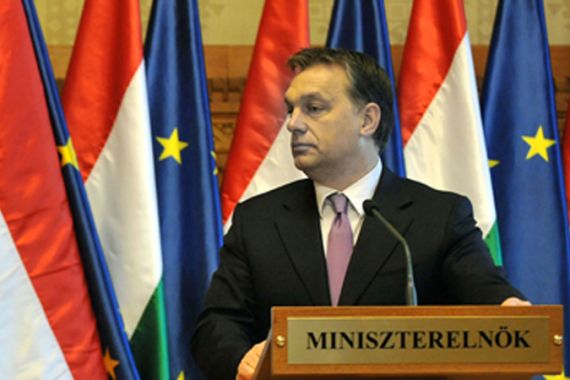Hungary may reconsider media law
Prime minister defends nation’s controversial media law, but says he will amend it if asked to by all members of the EU.

 |
| Hungary’s new media law allows for heavy fines for violations, ranging from $48,000 to $950,000 [Reuters] |
Viktor Orban, Hungary’s prime minister, has said his country is only prepared to change its much-criticised new media law if the European Union as a whole calls for it, and that it will not be dictated to by France and Germany.
The new media law – a nearly 200-page document that Germany’s Spiegel Online described in a headline as “A slow poison attacking democracy” – has been roundly criticised by European capitals, including Paris and Berlin, because of concerns about restrictions on media freedom.
Orban made the comments in Budapest on Thurday where the EU’s rotating presidency was handed from Belgium to Hungary at a ceremony in the capital’s parliament.
“It’s not up to the French or the Germans” to say whether the Hungarian law complies with EU regulations, Orban told foreign journalists ahead of the ceremony. “The EU should decide.”
Al Jazeera’s Tim Friend, reporting from Budapest, said that three journalists have already been suspended for voicing their protests against the new law.
“The European Union charter calls for respect for the rule of law, human rights, economic progress and media freedom,” said Friend.
“But some of his critics wonder if the Hungarian prime minister has read it before his country takes up the EU presidency.”
Despite acknowledging that the issue had meant that Hungary had had a bad start to its presidency, Orban defended the law which includes a watchdog that has the power to impose fines for violating “public interest, public morals or order”.
“If this [or that] passage of the Hungarian media act should be amended, then the media laws in France, Germany and the Danish media laws should be changed too as there is nothing in our legislation that is not in their media laws,” said Orban.
“I defy anyone to find anything in our law that is not in other EU member states’ media laws.”
However, Orban said that if the European Commission, which is studying the text, sought alterations, they would be made.
“We are part of the EU, there are rules of the game,” he said. “Any procedure that the EU starts and initiates, Hungary will accept it … If we are not right, and it becomes a fact, we will agree and we will correct it.”
‘Violations of human dignity’
Hungary says the media law had to be changed because the old legislation was ineffective, arguing that increasingly virulent tabloid TV channels and newspapers were acting with impunity.
Andras Koltay, a professor of media freedom who helped draft the law, used the examples of a newspaper that ran front page pictures of a Hungarian footballer shortly before he died during a game, and a TV reality show that questioned a girl about her sex life until she broke down.
“They were violations of human dignity, and that is what this new law aims to protect,” he said.
Andras Lanczi, political scientist and director of the Institute of Political Science at Corvinus University in Budapest, told Al Jazeera that it’s important to distinguish between “a law that is bad” and one where the “intention of the law is … put an end to the freedom of the press”.
Lanczi feels that law is intended to regulate the country’s media.
“The law could be bad, but the political intention is clear: Freedom of speech, freedom of the press, freedom of the media is untouchable in Hungary as well,” said Lanczi.
He also defended Orban as a “committed democrat” who is willing to change the law if needed.
But some passages in the law, which will be enforced by a government-appointed council, have raised profound concern about how far Hungary is willing to go to enforce tighter rules.
Article 17 of one part of the new law says “the media content may not offend or discriminate against – whether expressedly or by implication – persons, nations, communities, national, ethnic, linguistic and other minorities or any majority as well as any church or religious groups,” according to an official translation.
‘Disproportionate powers’
In a statement on its website, Reporters Without Borders urged the European Parliament to pass a resolution “condemning” the new law, which it slated as giving the government there “utterly disproportionate powers”.
“Although the government intends to ensure ‘fair balance’ in the media, it has not respected this principle in its choice of Media Council members, who all belong to the ruling Fidesz party,” read the statement.
“The council is supposed to enforce ‘balance’ but it will have no opposition representatives.”
When asked if he was governing in a similar style to Vladimir Putin, Russia’s prime minister, Orban dismissed the comparison.
“From 1998 to 2002, the Western press said I was reminiscent of Hitler and Il Duce [Benito Mussolini],” said Orban.
“Now they compare me with Putin and the Belarussian president [Alexander Lukashenko]. I will leave up to you decide if it is progress or not”, said the prime minister.
Orban’s centre-right Fidesz party holds a two-thirds majority in parliament, making it possible to drive through changes to the law quickly.
The media legislation has cast a shadow over Budapest’s EU presidency, with some politicians questioning whether Hungary is fit to run the EU’s agenda for the next six months.